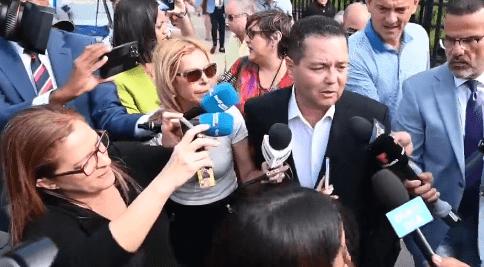
3 minute read
Jury ordered to continue deliberating in ex-Guaynabo mayor’s corruption case
By THE STAR STAFF
After a jury of 12 people retired to deliberate on Wednesday afternoon in the U.S. District Court in Hato Rey, former mayor of Guaynabo Ángel Pérez Otero reiterated upon leaving the court that he never reached a contractual agreement with businessman Oscar Santamaría.
Advertisement
A short while later, the judge in the case, Aida Delgado, ordered the jury to continue deliberating into the evening, according to media reports. No verdict had been reached as of press time.
“Thank God this will soon reach the culmination as I had indicated,” Pérez Otero said after the jury retired to deliberate. “As I have told you, we trust first in God the Father, then in the impartiality of the jury that can really see what this was. So we’re waiting.”
“I think one of the most important things is that when my defense asked Oscar [Santamaria], and I think it was made clear, to whom he had made a quid pro quó, with whom he had entered into agreements, and I do not know if you reported it, he mentioned three municipalities, he repeated it and he mentioned Cataño, he mentioned Aguas Buenas and he mentioned Trujillo Alto,” Pérez Otero said. “He did not mention Guaynabo. And he knows it; no agreement was ever reached.”
Asked if he was prepared to receive a guilty verdict, Pérez Otero, who was also president of the Mayors Federation and a New Progressive Party lawmaker in the island House of Representatives, replied: “We are going to wait.”
“I’m not going to cross the river,” he said. “So, right now. I don’t know if the jury will reach a verdict today, but we’re going to wait.”
Pérez Otero declined to answer directly if he did indeed receive bribes.
DR prosecutors provide details of embezzlement scheme in which local auto dealer is among the accused
By THE STAR STAFF
The Dominican Republic’s Public Prosecution Office has provided details as to how top government officials, including Donald Guerrero, a Puerto Rico auto dealer owner who was a former finance minister in that country, allegedly stole about $360 million in government funds.
The prosecution revealed Wednesday that in addition to being designated as one of the leaders of a criminal structure dedicated to embezzlement and fraud against the Dominican Republic, the former administrative minister of the presidency, José Ramón Peralta, allegedly infiltrated the investigation of Operation Squid, in which he appears as one of the main defendants, according to published reports. Among the 19 individuals arrested is Gonzalo Castillo, a former public works minister who won 37% of the vote when he ran as a presidential candidate for the Dominican Liberation Party.
Following Guerrero’s arrest, Axis Automotive Group, founded by Guerrero in Puerto Rico, came out in defense of the legality and integrity of its operations, highlighting its more than 27 years of service and leadership and transparency in the island’s automotive market.
However, Guerrero is facing a lawsuit in Puerto Rico for $21.8 million filed by the owner and founder of Autogermana, Eduardo Pellerano Nadal in San Juan Superior Court. Pellerano Nadal alleges that he hired Guerrero to manage his concessionaire in Puerto Rico and that instead he stole his business.

Dominican authorities reportedly said the illegal actions by the officials were committed from their own work spaces in the Ministry of Finance, the General Comptroller of the Republic, the General Directorate of National Assets, the State Sugar Council (CEA), the General Directorate of National Cadastre, the General Directorate of Budget and the Reserve Bank.
How did the scheme work? The Public Prosecutor’s Office pointed out that the accused former officials used eminent domain as a tool. They identified goods that had been declared of public utility without having been paid for at the fair price, causing the national government to disburse funds for their payments through fraudulent maneuvers.
The public prosecutor indicated that those funds returned to those involved, who appropriated them for their own economic benefit.
The public prosecutor also indicated that the alleged schemers set up a framework in which they managed to obtain the help of practicing professionals from the private sector who were in charge of processing transactions such as “the determination of irregular heirs, obtaining duplicate titles, annotated records, determination of a fair price and appraisal in record time.”
They would also have engaged in the falsification of public documents and the issuance of appraisals for fraudulent payments of expropriated property plots. All this, according to the public prosecutor, to obtain illicit profits.
The document explains that the framework used the modality of “fraudulent credit assignments” in favor of people who were responsible for the interests of former officials and authorized payments.
In addition, they created “portfolio companies” whose sole purpose was to collect the amounts of the credit transfers. These companies were dissolved once they received public funds as a result of embezzlement.










